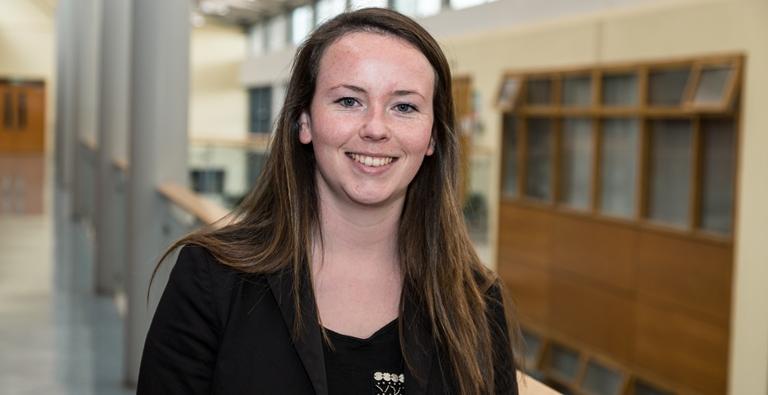

Spotlight on research: Shedding new light on finding cancer cells
Spotlight on research with Claire O’Connell, Irish Research Council-funded PhD researcher and DCU School of Physics
You are nearly finished your PhD on cancer cells. What have you been working on?
I am developing a way to identify cancer cells in the blood. When tumour cells get into the bloodstream they have a way to travel to other tissues and cause secondary cancers, so doctors need to know if this is happening.
These cells are hard to find though, because there might be just one cancer cell for every billion blood cells.
How have you been making those cancer cells easier to spot?
With my PhD supervisor Professor Colette McDonagh I have been designing and making tiny silica nanoparticles that can stick to cancer cells in the blood. Each silica nanoparticle is like a tiny balloon and I fill them with molecules that fluoresce when you shine a light on them, and you can see that under a microscope.
So the nanoparticle full of molecules sticks to the outside of the cancer cell, and when you shine a light on it you can see it.
How could the technology be used in the future?
It will still need to be optimised, but I would hope that it will be used to monitor and diagnose cancer in patients, and you could also design the silica nanoparticles to stick to other types of cells too.
You are near the end of your PhD journey – how would you describe it?
Doing a PhD is a bit of a rollercoaster. You can have some really challenging times when things don’t seem to be working. Then you will have the days when you get really interesting results, and that makes up for the challenges.
So my advice to anyone doing a PhD is not to be deterred by the days where things don’t turn out as you thought they would, you just have to persevere!
You recently won DCU Faculty of Science and Health Outstanding Graduate Research Award – congratulations, what did that recognise?
It was partly for contributions towards academia - and particularly for collaborations with other researchers in different disciplines.
Then it was also for my work outside academia with outreach events like Physics Busking, where we do demonstrations and experiments in public and encourage members of the public to take part, and taking part in communications competitions where you have to talk about your research to a non-scientific audience.
It was surreal to get the award, and amazing. Another graduate student, Dennis Patterson, also won the award for his work on complex mathematical models.
How did you become interested in doing science outreach?
My friend Stephen Davitt, who is also doing a PhD in DCU, was telling me about Physics Busking when we were at lunch, and he encouraged me to do the training for it.
One of the most interesting times for me was when we did Physics Busking at the National Ploughing Championships, and of course we had lots of kids coming up and taking part and also older farmers, maybe in their 70s, who were really engaged and asking lots of questions.
You are busy writing up your thesis at the moment, but what do you do if you get spare time?
I like to run and swim, and recently I’ve started training in freediving. Freediving is where you hold your breath for ages and swim to depths underwater?
What inspired you to do that?
My boyfriend and I were on holiday in Indonesia last year. We were snorkeling and we wanted to be able to get closer to the reefs underwater. That got us thinking about freediving so we started training. I’m a swimmer and I can hold my breath for ages, but the hardest thing for me is to equalise the pressure in your ears as you go deeper in the water and you are upside down.
When you are back on land, what are your plans for the summer?
I hope to submit my PhD thesis in July. After that, I will definitely need another holiday!
